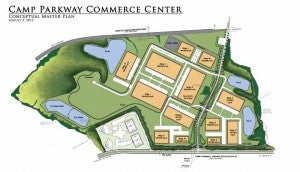Camp Parkway guidelines set
Published 11:40 am Friday, October 30, 2015
COURTLAND
The Southampton County Planning Commission is expected to discuss in November the possible change in zoning designation and subsequent development of the land adjacent to Riverdale Elementary School on Camp Parkway near the Franklin city limits. Meanwhile, county residents have openly questioned the developer’s intentions with the property.

The proposed design of the Camp Parkway Commerce Center development if it is rezoned as M-1 Light Industrial. — SUBMITTED
“The rumor that is out there is that this is going to be a dirty warehouse park,” Supervisor Barry T. Porter said, and added, “It will be a businesses park with a campus-like environment that is properly landscaped that can provide jobs and tax revenue to the county so we can afford to continue to provide the services that we need for the citizens.”
No business has stated its intentions to move to the property if it is modified from A-1 agricultural and R-1 residential to M-1 light industrial, according to county administrator Michael W. Johnson. But the county and the developer want to have the property shovel-ready and avoid going through the months-long rezoning process when a business may want to start building now.
If the property is ultimately rezoned, Section 18-281 of the county’s zoning ordinance states which businesses are permitted. It includes, but is not limited to:
• Agricultural or farm implements, manufacture, sale, storage or repair;
• Building materials storage and sales, open or enclosed, but not manufacturing or steel fabricating or junk storage;
• Contractor’s equipment storage yard or plant or rental of equipment commonly used by contractors;
• Electrical appliances or electronic instruments and devices, medical and dental equipment, optical or drafting equipment, toys, novelties, games, stamps, musical instruments, watches and clocks manufacture or assembly;
• Fertilizer storage in bags or bulk storage of liquid or dry fertilizer in tanks or in a completely enclosed building, but not manufacture or processing;
• Greenhouses, commercial, wholesale or retail;
• Industrial vocational training school, including internal combustion engines and including heavy construction equipment, materials handling equipment or similar equipment;
• Retail and service establishments primarily for the use and convenience of employees in the district;
• Sawmill (including cooperage stock mill) stationery and planing mill; etc.
The list also features a number of businesses that can be considered with a conditional use permit, but Johnson said that in order for those businesses to make the Camp Parkway property its home, the owner must request the conditional use permit through the same process by which this rezoning may take place.
The county also has a number of development standards in its zoning ordinance, which includes — but is not limited to — the promotion of harmonious relationships and compatibility with the surrounding and adjacent properties; appropriate landscaping with a particular emphasis on maintaining natural vegetation; properly maintained fencing; and proper storm water draining.
Additional conditions, or proffers, cannot be placed upon the property by the county.
“The county does not have the statutory authority to impose [further] conditions,” Johnson said. “It’s voluntary by those looking to develop.”
The developer proffered in the rezoning application 11 conditions in addition to aforementioned zoning ordinance regulations “for the protection of the community and enhancement of the development of the property.” While several of the businesses would have required conditional use permits regardless, this includes the prohibition of:
• Airports and landing fields, heliports and accessory uses;
• Circus or carnival grounds;
• Coal and wood yards;
• Dog kennels, commercial or noncommercial;
• Exposition center or fairgrounds;
• Firewood operation;
• Race track or course, any type, including horses, stock cars or drag strip;
• Rifle or pistol range;
• Sports arena or stadium, commercial athletic field or baseball park;
• Truck stop;
• Intermodal container storage, except those containers parked on the property temporarily for loading and unloading in connection with other M-1 permitted uses.
Because the developer approached the county and requested a proffer on the property, it would be legally binding and stay with the property unless it was modified through another rezoning process. That means that the above mentioned businesses would not be permitted on the property, even if it were sold to another developer.
When the developer approaches the county to build upon the land, it will be subject to a site plan review. The purpose of this review, according to Deputy Director of Community Development Beth Lewis, is to promote the orderly development of the county by means of improved project design, which will ensure that new development is appropriately functional, harmonious with its environment and is consistent with the comprehensive plan.
Johnson or his authorized deputy, agent or representative will examine the proposed site and render a decision based on the aforementioned objectives of the site review. The county administrator may approve the issuance of building permits if the conditions are met, make minor changes, deny the application or — when he is of the opinion that a proposed project is of such scale and impact that a decision should be made by the board of supervisors, the planning commission or both — ask for an advisory opinion. In any case, the business and its plans are thoroughly examined with respect to the county residents, the environment and comprehensive plan, as mentioned in the county’s code of ordinances.
To request the full list of permitted, prohibited and conditional zoning uses for Industrial District M-1 or a copy of the rezoning application and voluntary proffer statement by Hampton Roads Development, contact Johnson by phone at 653-3015, or mjohnson@southamptoncounty.org.




